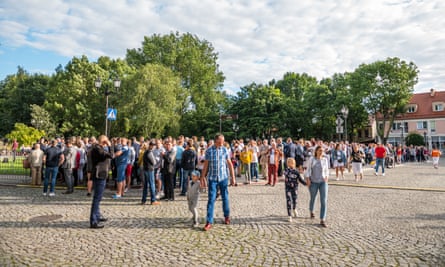When Andrzej Duda emerged on Sunday evening after narrowly securing re-election as Poland’s president, he did not address supporters outside the presidential palace in Warsaw, nor did he pick another location in the capital.
Instead, he spoke in Pułtusk, a pretty but dilapidated town of 19,000 people about 40 miles north of Warsaw, where hundreds of supporters waved Polish flags and chanted his name.
It was a symbolic choice. Sunday’s poll numbers show that while Duda might now be the president of all Poland, it was the small towns that put him in office. Almost every city in the country backed his liberal challenger, Rafał Trzaskowski.
Duda, backed by the rightwing populists from Poland’s ruling Law and Justice party (PiS), received 51.2% of the vote, while Trzaskowski got 48.8%. Duda won in only four of Poland’s 30 biggest cities, and in most of them he did considerably worse than five years ago, suggesting a deepening urban-rural divide.
In places such as Pułtusk, the PiS combination of increased government welfare spending and socially conservative rhetoric that frequently veers into outright homophobia is popular. Duda got 66% of votes in Pułtusk and the surrounding countryside.
“In the small towns, family is very important, people have closer social connections and they are more conservative. In the big cities people have become more atomised. They don’t even know their neighbours,” said Henryk Kowalczyk, one of the PiS MPs for the area and a former minister.
This comparison is far from unique to Poland, and has been referred to in some quarters as the divide between “somewheres” and “anywheres”. It can be observed in support for Donald Trump and Brexit, as well as in numerous countries with rightwing populist governments, where residents of big cities have defied the ruling parties and elected progressive mayors.

This has been in the case in Istanbul, in Budapest and in Warsaw, where Trzaskowski himself was elected mayor in 2018. In municipal elections that year, PiS won just five of 107 towns and cities.
But while populists struggle to control the cities, their liberal opponents have little success in the smaller towns like Pułtusk, allowing governments to portray themselves as the representatives of the “real” country.
Partly, this is political posturing: Duda, after all, is no village boy. He hails from Kraków, one of the country’s biggest metropolises, and has a PhD in law. But he has literally gone the extra mile to show his support for the provinces. During his first five-year term, Duda visited every single one of Poland’s 380 districts, often being the first senior politician to visit since independence three decades ago.
In Pułtusk, Duda’s re-election campaign was also energetic, with PiS representatives holding dozens of meetings with voters. By contrast, Trzaskowski’s Civic Platform is barely visible in the town.
Many people in the town “feel more valued” because of this kind of attention, said Jolanta Gorczyńska, a 56-year-old high school Polish literature teacher, speaking at her home in front of photographs of several generations of her family who also lived in Pułtusk.
She noted the popularity of the 500+ programme, which pays 500 złoty (£101) a month for every child, and said the social conservatism of PiS also plays a part in winning support, particularly given that the rural population is ageing. Gorczyńska said that about 70% of her students who leave the town to go university never come back.
The “special celebrations” organised by PiS on public holidays, involving singing and dancing, and the participation of top politicians, were as important as political language or financial handouts in creating a sense that PiS listens to rural voters.
Kowalczyk used similar reasoning for the decision to hold the election night event in the town: “It was a sign that PiS and Duda are supporting the people who are not so privileged, who have to struggle; for me it was a very natural thing to do,” he said.
Sylwia Urbańska, a sociologist at Warsaw University, said the PiS discourse about giving dignity back to the countryside is important, and compared it to late 19th-century anti-modernism.
“Then, as today, populists referred to the ideal of a rural community, a rural family, a rural woman as a bastion of national values, patriotism, the patriarchal ideal of family relations, heteronormativity, ethnic purity and Catholicism,” she said. She noted that in recent decades the Polish countryside has suffered from depopulation and the sharp economic effects of neoliberal policies introduced in the transition from communism. This, combined with an elite public discourse that paints the countryside as “stupid” or “backwards” has led increased receptiveness to notions of regaining dignity.

This rhetoric does not work with everyone, even in smaller towns. “PiS has done some good things, but for me they have crossed red lines,” said Robert Gajda, a cardiologist and businessman who runs 25 healthcare clinics in the area. He pointed to PiS attacks on the judiciary, something he felt was under-appreciated by most people in Pułtusk. “People think it’s about murderers and thieves, they don’t understand that sooner or later what happens with the courts can affect them too,” he said.
Gajda also criticised the “lack of tolerance” from PiS, particularly in the dehumanising rhetoric around LGBT people. There is no doubt that the relentless attacks on “LGBT ideology” from public television and Duda’s campaign got through to people, with many voters on election day saying they were voting for Duda because they believed he would fight “gender ideology” and protect families.
“Emphasising the moral, gender and religious purity of the countryside, and contrasting it with the city, identified with corrupt elites, the ‘gender monster’ and ‘LGBT+ spaces’ – these are the new qualities of Polish authoritarian populism,” said Urbańska.
